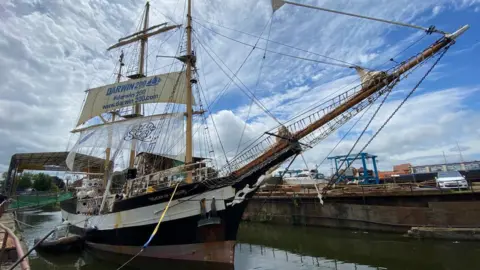Plastic pollution research ship moors in Bristol
 BBC
BBCA research ship on a 13-week journey around the British Isles to highlight the problem of marine plastic pollution has moored in Bristol.
The Pelican of London has brought with it its team of marine experts and researchers.
Bristol charity City to Sea will be surveying the coastline and will set sail again later today.
Jo Morely, from the charity, said the project will inspire people to tackle plastic pollution and get "ship shape".
City to Sea has teamed up with environmental research organisation Darwin200 to find out more about plastic pollution in the country's coastal waters.
The research team hopes to reconnect the public with the issue of single-use plastic.
 Stewart McPherson
Stewart McPhersonThe team will visit places including Lundy, The Scillies, Shetland, the Outer Hebrides and Orkney during the expedition.
Plastic researcher and project director of Sea Sanctuaries Trust Stephanie Lavelle said: "It's an honour to be leading a team of young scientists on the Pelican of London that would have been the same age as Darwin when he left on the beagle.
"I don't think he would have imagined the challenges we face today with climate change and plastic pollution.
"It's everywhere we look, even when there are beach cleans going on when we do our surveys, we are still finding an amazing amount of single use plastics like plastic bottles and fragments."
'More important than ever'
City to Sea's head of marketing and campaigns Jo Morley said: "As we start to emerge from the pandemic, we believe it's more important than ever to get the issue of plastic pollution back on the agenda.
"This first of a kind study will provide invaluable data as well as compelling evidence to inspire people, businesses and governments to get ship-shape when it comes to tackling plastic pollution.
"Our oceans, locally and globally, play a crucial role in our fight against climate change, and they need our help now, more than ever before. "
